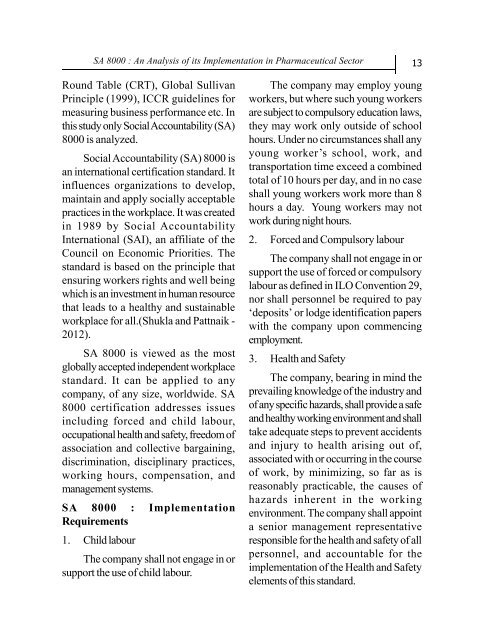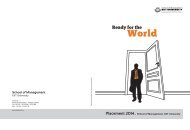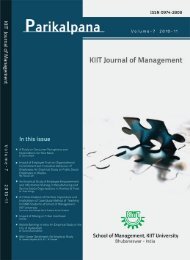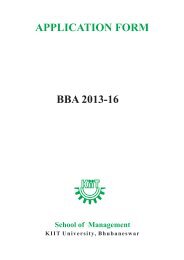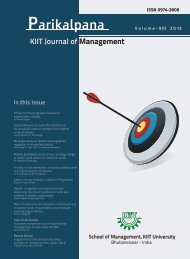Download - School of Management, KIIT University
Download - School of Management, KIIT University
Download - School of Management, KIIT University
Create successful ePaper yourself
Turn your PDF publications into a flip-book with our unique Google optimized e-Paper software.
SA 8000 : An Analysis <strong>of</strong> its Implementation in Pharmaceutical Sector<br />
13<br />
Round Table (CRT), Global Sullivan<br />
Principle (1999), ICCR guidelines for<br />
measuring business performance etc. In<br />
this study only Social Accountability (SA)<br />
8000 is analyzed.<br />
Social Accountability (SA) 8000 is<br />
an international certification standard. It<br />
influences organizations to develop,<br />
maintain and apply socially acceptable<br />
practices in the workplace. It was created<br />
in 1989 by Social Accountability<br />
International (SAI), an affiliate <strong>of</strong> the<br />
Council on Economic Priorities. The<br />
standard is based on the principle that<br />
ensuring workers rights and well being<br />
which is an investment in human resource<br />
that leads to a healthy and sustainable<br />
workplace for all.(Shukla and Pattnaik -<br />
2012).<br />
SA 8000 is viewed as the most<br />
globally accepted independent workplace<br />
standard. It can be applied to any<br />
company, <strong>of</strong> any size, worldwide. SA<br />
8000 certification addresses issues<br />
including forced and child labour,<br />
occupational health and safety, freedom <strong>of</strong><br />
association and collective bargaining,<br />
discrimination, disciplinary practices,<br />
working hours, compensation, and<br />
management systems.<br />
SA 8000 : Implementation<br />
Requirements<br />
1. Child labour<br />
The company shall not engage in or<br />
support the use <strong>of</strong> child labour.<br />
The company may employ young<br />
workers, but where such young workers<br />
are subject to compulsory education laws,<br />
they may work only outside <strong>of</strong> school<br />
hours. Under no circumstances shall any<br />
young worker’s school, work, and<br />
transportation time exceed a combined<br />
total <strong>of</strong> 10 hours per day, and in no case<br />
shall young workers work more than 8<br />
hours a day. Young workers may not<br />
work during night hours.<br />
2. Forced and Compulsory labour<br />
The company shall not engage in or<br />
support the use <strong>of</strong> forced or compulsory<br />
labour as defined in ILO Convention 29,<br />
nor shall personnel be required to pay<br />
‘deposits’ or lodge identification papers<br />
with the company upon commencing<br />
employment.<br />
3. Health and Safety<br />
The company, bearing in mind the<br />
prevailing knowledge <strong>of</strong> the industry and<br />
<strong>of</strong> any specific hazards, shall provide a safe<br />
and healthy working environment and shall<br />
take adequate steps to prevent accidents<br />
and injury to health arising out <strong>of</strong>,<br />
associated with or occurring in the course<br />
<strong>of</strong> work, by minimizing, so far as is<br />
reasonably practicable, the causes <strong>of</strong><br />
hazards inherent in the working<br />
environment. The company shall appoint<br />
a senior management representative<br />
responsible for the health and safety <strong>of</strong> all<br />
personnel, and accountable for the<br />
implementation <strong>of</strong> the Health and Safety<br />
elements <strong>of</strong> this standard.


